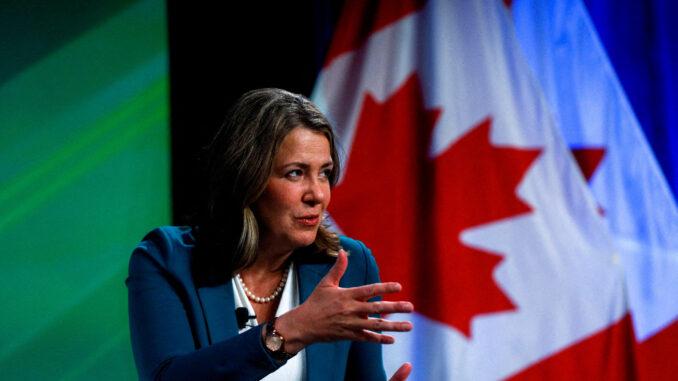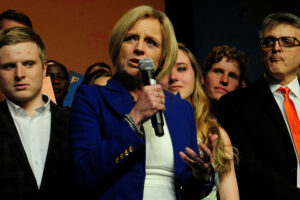
By Steve Scherer
OTTAWA (Reuters) – The fortunes of Alberta’s politicians often go hand-in-hand with the Western Canadian province’s oil and gas sector, its biggest industry, and the question of who will be its greatest advocate is a major theme in the final week before Albertans pick their leader.

Polls are split on whether Premier Danielle Smith’s ruling United Conservative Party (UCP) or Rachel Notley’s left-leaning New Democratic Party (NDP) will win the May 29 vote.
“We know that as long as we keep our energy industry strong, we’re going to keep Alberta’s economy strong,” Smith said in a debate on Thursday. “Ms. Notley won’t do that.”
Smith is playing in to a perception already present among the electorate. Some 51% of Albertans say Smith will be best at managing the oil and gas sector, compared with 32% for Notley, according to an Angus Reid Institute poll published last week.
Notley first swept to power in 2015, ending more than four decades of rule by Progressive Conservatives in Alberta, but oil prices crashed during her term. She introduced production curtailments to bolster prices, a move that drew support from some major producers and fierce criticism from others.
She lost the 2019 election to UCP leader Jason Kenney, whom Smith replaced last year. Smith, a former conservative talk-radio host, has stirred a number of controversies in just seven months and this week was reprimanded for violating ethics rules.
Notley also worked closely with Liberal Prime Minister Justin Trudeau when the federal government bought the Trans Mountain pipeline in 2018 to ensure its expansion would be completed, providing a needed export channel for Alberta crude on the West Coast. Trudeau is deeply unpopular among Alberta conservatives due to his climate-change policies.
“When we talk about my record in oil and gas, I think it’s kind of hard to forget the big thing, which is the first pipeline to tidewater in 50 years,” Notley said in response to Smith during the debate.
Canada has the world’s third-largest oil reserves, most of which are held in northern Alberta’s vast oil sands, which account for roughly two-thirds of the country’s 4.9 million barrels per day of production, so it is only natural that they would be an economic touchstone for all provincial leaders.
“Rachel Notley is perhaps not convincing as many Alberta voters (as Smith) that she is as good or worthy of leading the province on her defense of oil and gas, even if her approach is not vastly different than that of Smith,” said Shachi Kurl, president of Angus Reid.
Benchmark U.S. light crude was going for more than $71 a barrel last week. It traded around $26.05 per barrel when Notley was in power.
Smith took over her party from Kenney after an oil slump during the pandemic and as prices rebounded, and her first budget ramped up spending for healthcare, education and highways.
“Resource revenues allow you … to run a surplus budget, keep taxes low, and deliver those services. It’s almost political magic,” said Andrew Leach, a professor of economics and law at the University of Alberta.
(Reporting by Steve Scherer in Ottawa; Additional reporting by Fergal Smith in Toronto; Editing by Matthew Lewis)

Leave a Reply